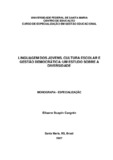| dc.contributor.advisor | Klinke, Karina | |
| dc.creator | Cargnin, Elisane Scapin | |
| dc.date.accessioned | 2016-03-16T15:02:09Z | |
| dc.date.available | 2016-03-16T15:02:09Z | |
| dc.date.issued | 2008-01-29 | |
| dc.date.submitted | 2007 | |
| dc.identifier.uri | http://repositorio.ufsm.br/handle/1/1339 | |
| dc.description | Monografia (especialização) - Universidade Federal de Santa Maria, Centro de Educação, Curso de Especialização em Gestão Educacional, RS, 2007. | por |
| dc.description.abstract | This monographic work, qualitative in nature, aims to question the possibilities, the
contradictions and the benefits of young participation in school management, in terms
of diversity of the language of the students and the necessity to have it as a basis for
young education in a proposal of democratic management. The research questions:
how the linguistic diversity is treated in the basic school? The inquiry was developed
in a school of the State System of Education from Rio Grande do Sul (Professor
Edna May Cardoso School) situated in Santa Maria City, and had as interviewed
characters four learners (one girl and three boys) and as cited characters two
teachers of the second stage of the elementary school and high school during the
years of 2006 and 2007. The methodology used was of participant research, with
comments in the lessons and in the pedagogical meetings and with semi-structured
interviews and press conferences applied to learners, analyzed on the basis of
theoretical reference of the fields of sociological and linguistic knowledge. The
analysis is built on confrontation among the current proposals of democratic
management in School’s Political Pedagogical Project and the current legislation on
education, and the point of view of learners about the uses of language in the school.
It was observed in the research that there is a preconception in relation to the
language of the student whom does not feel at ease in front of his/her classmates
and teachers to participate in school activities. It is proven that the team of teachers
of the management school in the basic school is not prepared to deal with equity the
linguistic diversity. | eng |
| dc.language | por | por |
| dc.publisher | Universidade Federal de Santa Maria | por |
| dc.rights | Acesso Aberto | por |
| dc.subject | Linguagem | por |
| dc.subject | Cultura escolar | por |
| dc.subject | Gestão democrática | por |
| dc.title | Linguagem dos jovens, cultura escolar e gestão democrática: um estudo sobre a diversidade | por |
| dc.title.alternative | Language of the young, school culture and democratic management: a study about the diversity | eng |
| dc.type | Trabalho de Conclusão de Curso de Especialização | por |
| dc.degree.local | Santa Maria, RS, Brasil. | por |
| dc.degree.specialization | Gestão Educacional | por |
| dc.description.resumo | Este trabalho monográfico, de caráter qualitativo, tem por objetivo problematizar as
possibilidades, as contradições e os benefícios da participação dos jovens na gestão
escolar, sob a perspectiva da diversidade da linguagem dos alunos e da
necessidade de tê-la como base para a escolarização de jovens em uma proposta
de gestão democrática. A pesquisa questiona: como a diversidade lingüística é
tratada na escola básica? A investigação foi desenvolvida em uma escola do
Sistema Estadual de Ensino do Rio Grande do Sul (Colégio Professora Edna May
Cardoso), situada no Município de Santa Maria, e teve como sujeitos entrevistados
quatro discentes (uma garota e três rapazes) e como sujeitos citados duas
professoras da segunda etapa Ensino Fundamental e do Ensino Médio, durante os
anos de 2006 e 2007. A metodologia utilizada foi a de pesquisa participante, com
observações nas aulas e nas reuniões pedagógicas e com entrevistas semiestruturadas
e coletivas aplicadas aos discentes, analisadas com base no referencial
teórico dos campos de conhecimento sociológico e lingüístico. A análise é construída
no confronto entre as propostas atuais de gestão democrática, presentes no Projeto
Político Pedagógico da Escola e com a legislação atual sobre educação, e o ponto
de vista dos discentes sobre os usos da linguagem na escola. Observou-se na
pesquisa que existe preconceito em relação à linguagem do alunado, o qual não se
sente à vontade diante de seus colegas e dos professores para participar nas
atividades escolares. Evidencia-se que a equipe de professores da gestão escolar
na escola básica não está preparada para tratar com eqüidade a diversidade
lingüística. | por |
| dc.publisher.unidade | Centro de Educação | por |


